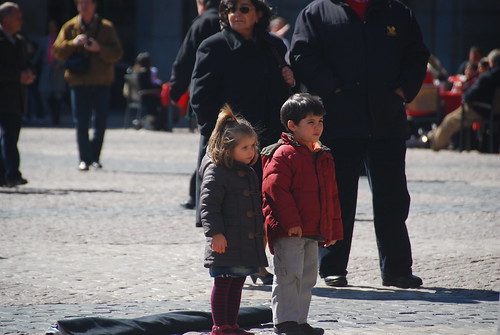Difference between revisions of "Adopting from Spain"
(→Hague Convention Information) |
(→Who Can Adopt) |
||
| Line 39: | Line 39: | ||
=Who Can Adopt= | =Who Can Adopt= | ||
| + | Adoption between the United States and Spain is governed by the Hague Adoption Convention. Therefore to [[adopt]] from Spain, you must first be found eligible to [[adopt]] by the U.S. Government. The U.S. Government agency responsible for making this determination is the Department of Homeland Security, U.S. Citizenship and Immigration Services (USCIS). Read more on Who Can [[Adopt]]. Learn more. | ||
| + | |||
| + | |||
| + | In addition to these U.S. requirements for prospective [[Adoptive Parents|adoptive parents]], Spain also has the following requirements for prospective [[Adoptive Parents|adoptive parents]]: | ||
==Residency== | ==Residency== | ||
| + | |||
| + | [[Adoptive Parents|Adoptive parents]] must be legal residents of Spain and must remain in Spain throughout the adoption proceeding if it takes place in Spain | ||
==Age of Adopting Parents== | ==Age of Adopting Parents== | ||
| + | |||
| + | To be eligible to [[adopt]] any child, a prospective [[Adoptive Parent|adoptive parent]] must be at least twenty-five years old and be at least fourteen years older than the adoptee. If a married couple wishes to [[adopt]], at least one of the two must meet the twenty-five-year age requirement. | ||
==Marriage== | ==Marriage== | ||
| + | |||
| + | To jointly [[adopt]], a couple must be married or otherwise legally treated as a married couple under Spanish law However, a prospective [[Adoptive Parent|adoptive parent]] does not need to be married to [[adopt]]. If only one spouse in a married couple applies to [[adopt]], the consent of the other spouse is necessary. '''NOTE:''' Spain legalized same-sex marriage in 2005. | ||
==Income== | ==Income== | ||
| + | |||
| + | There are no specific income requirements related to adoption. The judge assesses all factors related to the welfare of the child before issuing an adoption order. | ||
==Other== | ==Other== | ||
| + | None. | ||
=Who Can Be Adopted= | =Who Can Be Adopted= | ||
Revision as of 19:52, 9 April 2014
Contents
Hague Convention Information
Spain is party to the Hague Convention on Protection of Children and Co-operation in Respect of Intercountry Adoption (Hague Adoption Convention). Therefore all adoptions between Spain and the United States must meet the requirements of the Convention and U.S. law implementing the Convention.
Spain is not considered a country of origin in intercountry adoption. There are few children eligible for adoption, with a long waiting list of Spanish prospective adoptive parents. Most intercountry adoptions in Spain are by legal residents of Spain who adopt in third countries.
While legally possible, intercountry adoption of a Spanish orphan by foreigners is unlikely. No Spanish orphans have received U.S. immigrant visas in the past five fiscal years. The information provided is intended primarily to assist in rare adoption cases from Spain, including adoptions of Spanish children by relatives in the United States, as well as adoptions from third countries by Americans living in Spain.
NOTE: Special transition provisions apply to adoptions initiated before April 1, 2008. Learn more.
Who Can Adopt
Adoption between the United States and Spain is governed by the Hague Adoption Convention. Therefore to adopt from Spain, you must first be found eligible to adopt by the U.S. Government. The U.S. Government agency responsible for making this determination is the Department of Homeland Security, U.S. Citizenship and Immigration Services (USCIS). Read more on Who Can Adopt. Learn more.
In addition to these U.S. requirements for prospective adoptive parents, Spain also has the following requirements for prospective adoptive parents:
Residency
Adoptive parents must be legal residents of Spain and must remain in Spain throughout the adoption proceeding if it takes place in Spain
Age of Adopting Parents
To be eligible to adopt any child, a prospective adoptive parent must be at least twenty-five years old and be at least fourteen years older than the adoptee. If a married couple wishes to adopt, at least one of the two must meet the twenty-five-year age requirement.
Marriage
To jointly adopt, a couple must be married or otherwise legally treated as a married couple under Spanish law However, a prospective adoptive parent does not need to be married to adopt. If only one spouse in a married couple applies to adopt, the consent of the other spouse is necessary. NOTE: Spain legalized same-sex marriage in 2005.
Income
There are no specific income requirements related to adoption. The judge assesses all factors related to the welfare of the child before issuing an adoption order.
Other
None.
Who Can Be Adopted
How to Adopt
Adoption Authority
The Process
Traveling Abroad
Applying for Your U.S. Passport
A valid U.S. passport is required to enter and leave Spain. Only the U.S. Department of State has the authority to grant, issue, or verify U.S. passports. Getting or renewing a passport is easy. The Passport Application Wizard will help you determine which passport form you need, help you to complete the form online, estimate your payment, and generate the form for you to print-all in one place.
Obtaining Your Visa
In addition to a U.S. passport, you also need to obtain a visa. A visa is an official document issued by a foreign country that formally allows you to visit. Where required, visas are attached to your passport and allow you to enter a foreign nation. To find information about obtaining a visa for Spain, see the Department of State's Country Specific Information.
Staying Safe on Your Trip
Before you travel, it's always a good practice to investigate the local conditions, laws, political landscape, and culture of the country. The State Department is a good place to start. The Department of State provides Country Specific Information for every country of the world about various issues, including the health conditions, crime, unusual currency or entry requirements, and any areas of instability.
Staying in Touch on Your Trip
When traveling during the adoption process, we encourage you to register your trip with the Department of State. Travel registration makes it possible to contact you if necessary. Whether there's a family emergency in the United States, or a crisis in Spain, registration assists the U.S. Embassy or Consulate in reaching you. Registration is free and can be done online.
After Adoption
What resources are available to assist families after the adoption?
Many adoptive parents find it important to find support after the adoption. Take advantage of all the resources available to your family -- whether it's another adoptive family, a support group, an advocacy organization, or your religious or community services.
Here are some good places to start your support group search:
Child Welfare Information Gateway
North American Council on Adoptable Children
Adoption Services Support Group for Adopting Persons
SOURCE
Intercountry Adoption, Bureau of Consular Affairs. U.S. Department of State Country Information










